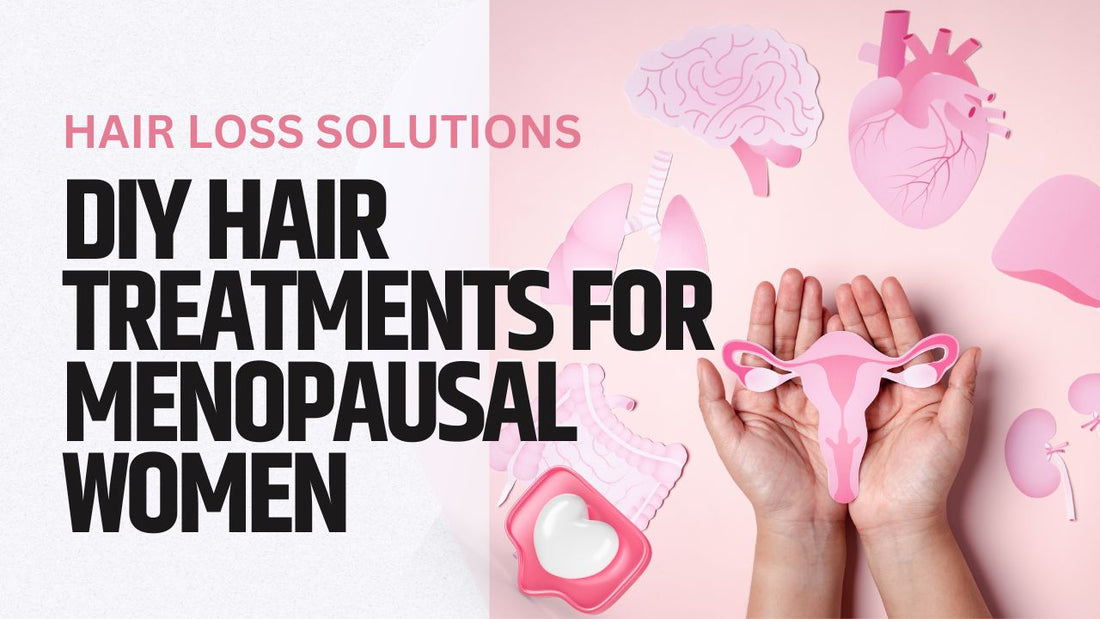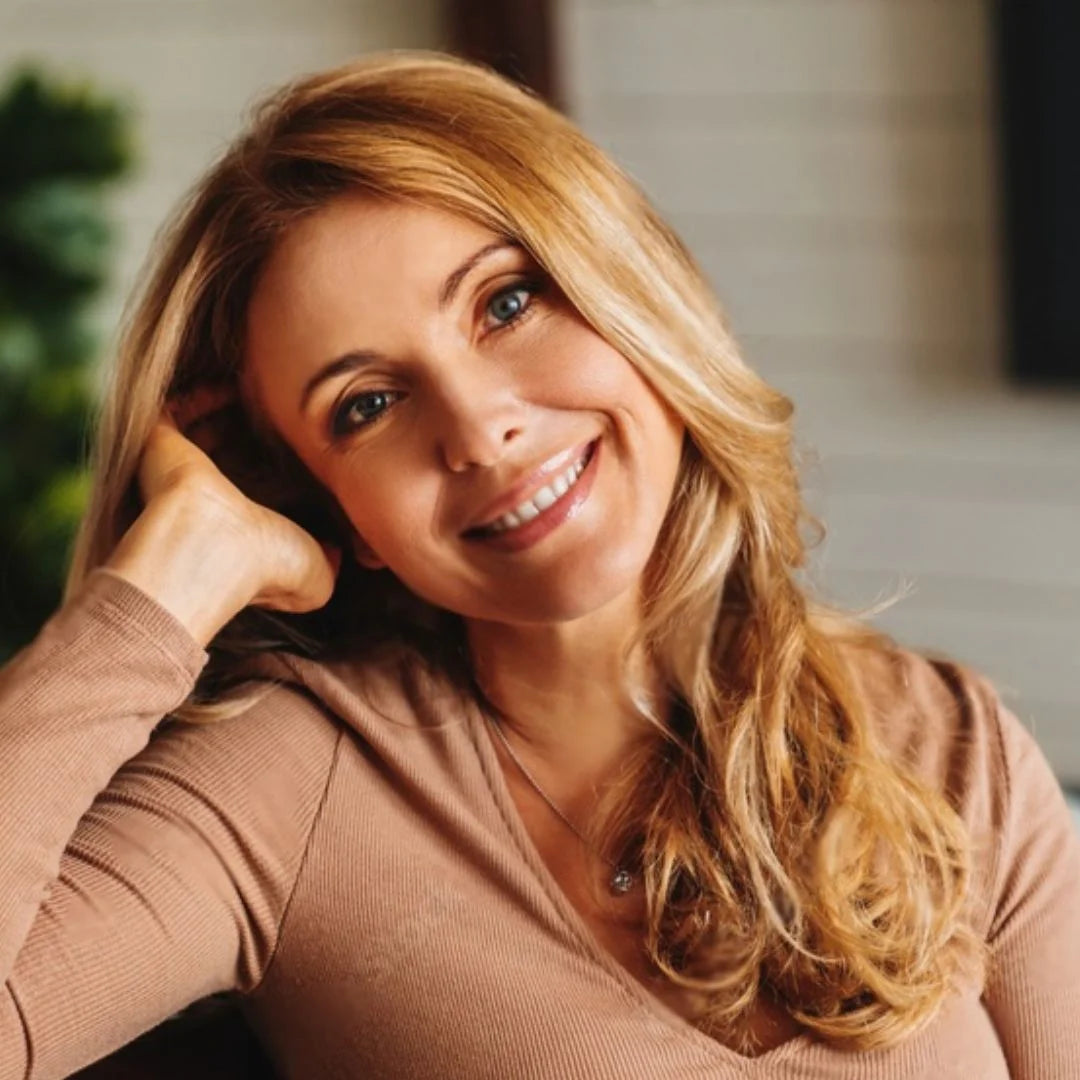
DIY Hair Treatments for Menopausal Women
Share
Menopause signifies a crucial phase in a woman's life, bringing with it a myriad of physiological alterations. One change that frequently goes unnoticed is the impact on hair health. This detailed guide explores the complex connection between menopause and shifts in hair quality. Offering actionable DIY Menopausal Hair Treatments, our article aims to furnish you with economical and uncomplicated solutions. Through DIY Menopausal Hair Treatments, you can proactively address these changes, focusing on maintaining or restoring the health of your hair. So, let's dive into the subject and explore various DIY Menopausal Hair Treatments to guide you through this transitional period.
Understanding Menopause and Hair Changes
Physiological Changes During Menopause
So, what actually happens during menopause? Primarily, menopause involves a decrease in the production of certain hormones like estrogen and progesterone. These hormones play a vital role in maintaining not just your reproductive health, but also your hair's vitality. When their levels decline, your hair can be adversely affected.

Common Hair Problems During Menopause
Now that we've tackled the hormonal aspect, let's explore the common hair issues women may encounter during menopause:
- Hair Thinning: With the decreased production of hormones, the hair growth cycle may become shorter. Consequently, your hair may thin out and lose volume.
- Dryness: Lower levels of estrogen often lead to a reduction in natural oils, making your hair prone to dryness and frizz.
- Breakage: Compounded by dryness and decreased volume, hair during menopause is more susceptible to breakage.

Why DIY Treatments Can Be Effective
Opting for DIY treatments isn't just a trend; it's a practical choice for several reasons:
- Cost-efficiency: Let's face it; specialized treatments can be expensive. By opting for DIY solutions, you can save a substantial amount of money over time.
- Control Over Ingredients: With DIY, you know exactly what you're putting onto your scalp and hair. This can be especially helpful if you have allergies or sensitivities.
- Flexibility in Customization: The beauty of DIY is that you can tweak recipes based on your unique needs and preferences.

This is the first of three sections that will cover a host of effective DIY hair treatments specifically for menopausal women, safety precautions, and even spotlight a product that could be a game-changer for your hair care routine. So, keep reading to enhance your hair health journey during menopause.
Spotlight: Proactive Rosemary Hair Booster Oil
Before we explore various DIY treatments, it's important to spotlight a product that's been making waves in the hair care community—Proactive Rosemary Hair Booster Oil. This exceptional product can not only be incorporated into your DIY treatments but can also serve as a standalone treatment for various hair issues.
-
Key Benefits:
- Stimulates hair follicles
- Enhances blood circulation in the scalp
- Provides essential nutrients for hair growth
-
How to Use:
- As a pre-shampoo treatment
- Mixed with your regular hair masks
- As a daily scalp massage oil
By using Proactive Rosemary Hair Booster Oil, you'll likely see a considerable difference in the thickness, texture, and overall health of your hair.
Effective DIY Menopausal Hair Treatments
Let's move on to a curated list of DIY treatments that you can effortlessly prepare and use at home. These are designed to address the specific challenges menopausal women face with hair care.
Oil Infusion Treatment
An oil infusion can deeply nourish your scalp and hair, providing long-lasting moisture.
-
Ingredients:
- 2 tbsp Coconut oil
- 1 tbsp Proactive Rosemary Hair Booster Oil
-
Instructions:
- Heat the oils slightly.
- Massage into scalp and hair.
- Leave for 30 minutes before shampooing.

Avocado and Honey Mask
For an added moisture boost, an avocado and honey mask works wonders.
-
Ingredients:
- 1 ripe avocado
- 2 tbsp honey
- 1 tbsp Proactive Rosemary Hair Booster Oil
-
Instructions:
- Mash the avocado and mix in honey and oil.
- Apply to hair and leave for 30-45 minutes.
- Rinse and shampoo as usual.

Safety Precautions
Although DIY treatments offer numerous benefits, there are certain precautions you should take:
- Patch Test: Always perform a patch test for any new ingredient or product.
- Concentration: Be mindful of the concentration of essential oils and other active ingredients.
- Allergies: Be aware of any allergies you have and avoid those ingredients.
Maintaining Your Hair Health: A Consistent Routine
A well-balanced routine is crucial for preserving the health of your hair, especially as menopausal symptoms can take a toll.
Regular Trimming
Regular trims get rid of split ends and promote hair growth. Aim for a trim every 6-8 weeks.
Consistent Washing Schedule
Overwashing can strip your hair of natural oils. Stick to washing your hair 2-3 times a week.
Diet and Supplementation
Nutrition plays a crucial role in hair health. Include more protein, vitamins, and Omega-3s in your diet, and consult your healthcare provider for any supplements you might need.

Rejuvenate Your Lifestyle
Menopause is a significant life transition, and your overall lifestyle can profoundly affect your hair health.
- Exercise: Regular physical activity can help manage hormonal changes.
- Stress Management: Methods like meditation and mindfulness can reduce stress, which is beneficial for your hair.

Conclusion: Empower Your Hair Care Journey
Menopause brings challenges, but it's a phase of life that also brings an opportunity to refocus on your self-care, including the health of your hair. With the right strategies, products like Proactive Rosemary Hair Booster Oil, and a consistent routine, you can navigate this period with confidence and grace.
FAQ
Can menopausal women use any hair oil?
It's best to use oils specifically designed for the changing needs of your hair, like Proactive Rosemary Hair Booster Oil.
How often should I apply hair masks?
Once a week is generally sufficient, but you can adjust according to your hair's needs.
Is it safe to color my hair during menopause?
Yes, but make sure to keep your hair well-conditioned and opt for ammonia-free colors.
What are the signs of menopausal hair loss?
Thinning around the crown and a wider part are common signs.
Can a diet change improve my hair health?
Absolutely, a balanced diet rich in essential nutrients can greatly improve your hair health.
















